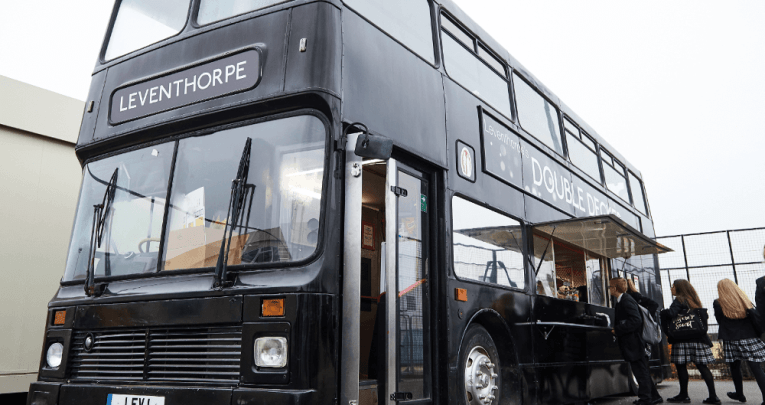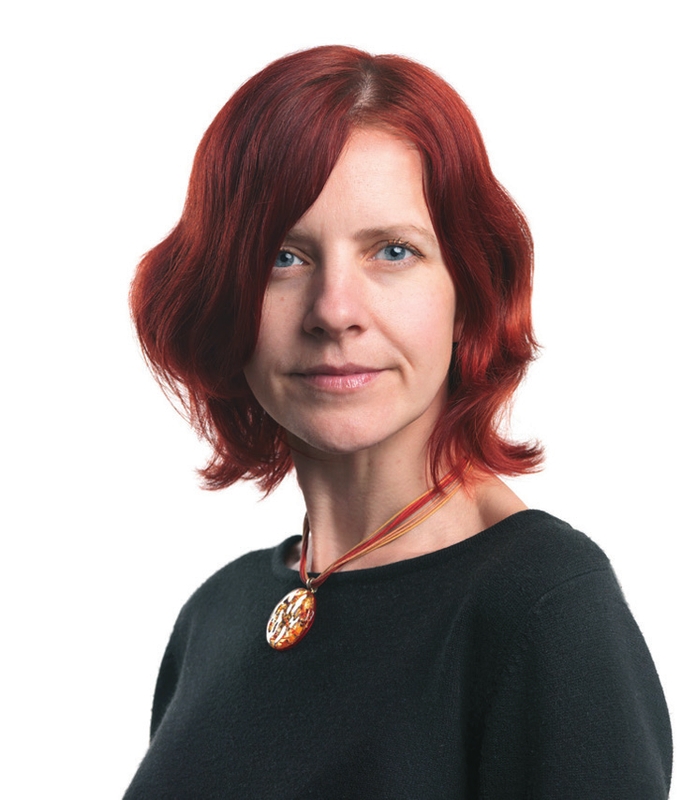Meet the Academy Where Staff are Falling in Love with Teaching Again

Helen Mulley visits Leventhorpe school, in Hertfordshire – an outstanding academy that is refusing to rest on its laurels…

- by Helen Mulley

As I stand in the airy, high-ceilinged reception area at Leventhorpe school, waiting for the arrival of Dave Harvey – assistant headteacher and my guide for this morning’s learning walk – I look around, as I always do at this stage of a visit, for clues as to what the 11-18 academy wants to tell visitors about itself.
And immediately I have my answer – because although the space contains some beautiful examples of students’ artwork and D&T projects (“We’re creative!”), it’s completely dominated by a single, massive display board, on which is printed an infographic showing post-KS5 pathways for last year’s leavers, the vast majority of which point to university courses at various institutions around the country, many of them impressively niche and/or prestigious.
The message is clear: this is a place of aspiration. Young people who come here are on an exciting, ambitious journey.
And so, it turns out, is Leventhorpe itself.
Judged ‘outstanding’ by Ofsted in 2012, and serving a community that is, by any definition ‘reasonably affluent’ (although there are families in difficult situations alongside the City commuters), Leventhorpe might look like an easy leadership gig on paper; but in reality, of course, there’s no such thing, especially in today’s education landscape.
The current head, Malcolm White, certainly doesn’t see his job as any kind of sinecure. He was appointed in 2018, and took over the role completely at the start of the 2018/19 academic year, after five months of shadowing the previous incumbent.
“That felt like a bit of a release,” he tells me. “By the end of the handover period, I just wanted to get on with it. But of course, you have to bring your staff with you – and anyway, this wasn’t a school in need of radical change but rather, a shift of emphasis.”
Fresh thinking
“Our 2012 grading was based quite heavily on the work we’d been doing with Guy Claxton’s Building Learning Power approach, which we rebranded as ‘Learning at Leventhorpe’”, explains Dave Harvey.
“But by 2017, it had all gone a bit flat, or stale. We weren’t good at training new staff as they joined us, and we lost that common language, somehow. So the head at the time, Jon Locke, charged me and a colleague – Belinda Kistell – with finding a way of invigorating our teaching and learning.
“Quite quickly, we came across Thinking Schools, and Richard Cummings at Thinking Matters pointed us towards some examples to look at: Barton Court, in Canterbury, and Glenmoor & Winton, in Bournemouth.
“It was the Bournemouth schools that gave us our epiphany moment – these are comprehensives in a selective area, doing stunning work. To witness the positivity of the staff, and students talking so fluently about their learning, using thinking tools; well, we knew this would work at Leventhorpe.”
Two years – and one change of leadership – later, and Leventhorpe’s progress towards becoming a fully accredited Thinking School is well underway.
From the start of Y7, students are taught to identify the eight most common types of thinking process, and use the categories to organise their thoughts and plan their responses, with the help of tools like ‘thinking maps’, which provide, as Dave puts it, “a common visual language to access content and curriculum.”
De Bono’s ‘thinking hats’ schema adds an extra layer of understanding. The young people are enthusiastic, because it helps them engage with their learning in a much more sophisticated way; teachers, according to Dave, are “falling in love with teaching again”.
A flexible approach
This might all be starting to sound rather worryingly prescriptive – but that’s not the approach at Leventhorpe.
There is no expectation that the thinking tools will be used a certain way in every lesson – or even at all – but they are so intuitive (and carry such a low planning burden) that staff and learners alike turn to them almost automatically.
I saw sparkly headgear being used in a Y8 business studies session, as pupils discussed marketing priorities; and coloured lights around the interactive whiteboard representing the same thinking modes for a KS4 English lesson about Macbeth.
I watched Y11 scientists organise their revision as A3-sized, self-created thinking maps.
And in the double-decker bus that Malcolm White bought off eBay, and converted into a snack bar underneath a safe space for nurture and intervention groups, as well as clubs, I listened as a group of Y7 children, identified as being at risk of disengagement or school refusal, discussed complex dilemmas with maturity, respect and confidence.
“As a school, you take an approach where you try and carve out a universal offer that all students can access,” says Malcolm White.
“And for us, that means trying to develop self-reliant learners with strong metacognitive skills; students who are independent, and resilient. There’s a strong emphasis on the wellbeing agenda, because happy, content young people with good self-esteem are the best learners.
“We don’t drive everything by the outcomes, drilling the children until they hit targets. Instead, we start with the principle that if our pupils are comfortable and confident, with high aspiration – and have the skills they need to deal with all the external pressures that are thrown at them – then they will achieve the outcomes everyone wants for them.”
Moving forwards
“The perception out there of young people can be frustrating,” Malcolm continues.
“All the news is focused on how we can deal with gang/knife/drug culture – so many negative messages about what they are getting dragged into. But in schools, the experience of dealing with kids who are, on the whole, far more passionate, engaged and driven than those of my generation, is an absolute joy. And if we lose sight of that, we get a bit lost.”
It strikes me that it is the fate of too many schools graded ‘outstanding’ by Ofsted back when expectations were very different, and left outside the accountability system since then, to ‘get a bit lost’.
The Thinking Schools approach may not chime with every educator – but there is no doubt that for this academy, it’s keeping everyone travelling in the right direction.
Find out more about becoming a Thinking School at thinkingmatters.com.






